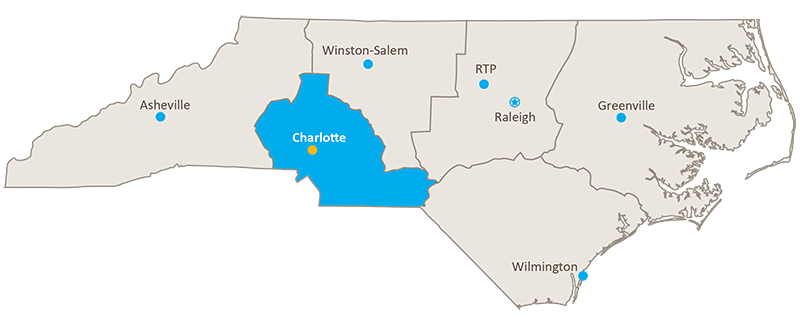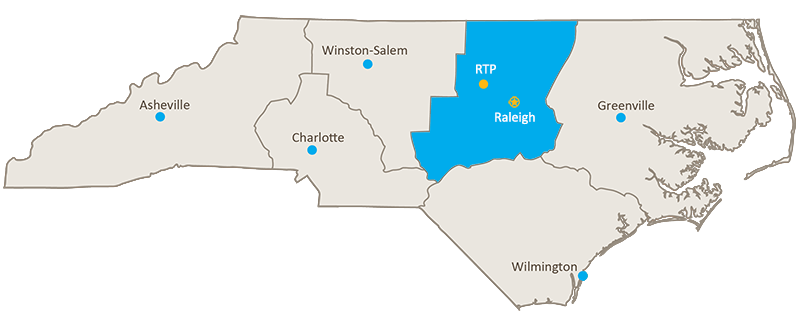
Shared Research Facilities and Equipment
Many facilities across North Carolina support life sciences research.
The listing covers core laboratory facilities at university and nonprofit research institutions that are open to researchers or collaborators outside of their home institutions.
Representatives of the core facilities listed below have voluntarily submitted their information. Not all institutions list available core lab facilities, but many are in the process of organizing and compiling these resources. As this information becomes available, we'll add those links.
NCBiotech has funded equipment in many core facilities in the state.
The Center's ongoing role is to provide this information portal. If you would like to submit a new listing or update an existing listing please fill this form.
This facility provides dedicated 3,000 sq. ft. designed for high resolution imaging and physiologic studies of airway epithelial cell structure/function.
Transmission electron microscopy, scanning electron microscopy, freeze-fracture, immunohistochemistry, high speed video analysis
- Human Performance, Nutrition, & Physiology
- Imaging & Microdissection
The Cellular and Molecular Imaging Facility at North Carolina State University is located in 4115 Gardner Hall (North Campus) and contains a number of state-of-the-art light microscopes, including a Zeiss LSM 710 confocal. CMIF primarily serves the NC State community and is also open to scientists from other universities and local industries. The rates posted on our website are for NCSU students, faculty and staff. Please enquire about rates for facility users outside NCSU. Training and imaging assistance is available.
Advanced light microscopy; Zeiss LSM 710 confocal; Zeiss Axioimager M2; Bitplane Imaris software; Metamorph software
- Imaging & Microdissection
CDI’s goal is to catalyze the growth of creative industries in the Piedmont Triad through design-focused activity based on advanced technologies. Services in rapid prototyping and design in various media are available.
Rapid prototyping, Motion capture, Data analysis, Visualization and modeling
- Human Performance, Nutrition, & Physiology
- Design Services & Machining
The Chapel Hill Analytical and Nanofabrication Laboratory (CHANL) offers access to a series of microscopy and spectroscopy tools as well as fabrication tools in our cleanroom. We are open to researchers from academia, non-profit labs and industry.
Electron microscopy with EDS, AFM, photolithography, reactive ion etch, thin film deposition, x-ray photoelectron spectroscopy, atomic layer deposition, cryo-ultramicrotome, XRD, FTIR, SEM, TEM, physical and chemical vapor deposition
- Crystallography, X-ray Diffraction, NMR, & EPR
- Imaging & Microdissection
- Nanotechnology
- Bioprocessing
The Chemistry and Fermentation Sciences Service Laboratory offers basic and advanced chemical analyses of craft beverage products. Detailed analyses such as phenolics, aroma compounds, and microbiology panels are also available. Call to discuss tailored analytical services.
Fermentation, wine, beer, grape, hop, phenolics, alcohol, distillate, food science, GC, HPLC, biofuels, sensory analysis
- Other -omics & Analytical
- Diagnostic Microbiology
The advanced technology in each core facility provokes a collaborative environment in which researchers receive support in the design, implementation, analysis, interpretation and reporting of research. The core labs include comparative medicine, proteomics and metabolomics, molecular biology, the imaging facility (which is comprised of Histology, electron microscopy, and confocal microscopy) as well as an immune monitoring core. The availability of sophisticated, centralized resources offers investigators an exceptional research advantage.
Comparative medicine, proteomics, metabolomics, molecular biology, imaging (confocal microscopy, electron microscopy, & histology) and immune monitoring
- Model Systems
- Biostatistics, Bioinformatics, & HPC
- Cell/Tissue Culture & Flow Cytometry
- Human Performance, Nutrition, & Physiology
- Imaging & Microdissection
- Design Services & Machining
- Pathology/Histology
- Other -omics & Analytical
The CMS DNA Analysis Core Facility provides UNCW faculty, students and researchers with the state-of-the-art infrastructure and expertise needed to generate and analyze DNA data for research and education.
DNA sequencing, DNA fragment analysis, Q-PCR
- Genetics & Genomics
The Comparative Pathology Laboratory’s core mission is to support the pathology needs of biomedical researchers in pursuit of natural and experimental models of human diseases. Located on the Clarkson Campus of the Wake Forest Baptist Medical Center, the laboratory is an integral part of the Center for Comparative Medicine Research, Section on Comparative Medicine, Department of Pathology, and the Comprehensive Cancer Center. The facilities consist of two major components: a full-service diagnostic and experimental necropsy suite and a histology and immunohistochemistry laboratory. Additionally, a wide range of professional expertise is available including veterinary staff pathologists and histotechnicians. Services include tissue and slide processing, and routine and specialized cytochemical staining. Finally, high throughput immunohistochemistry and in situ hybridization services are available through customized protocols using a Leica Bond RX autostainer platform. The laboratory has over 25 years of experience working with nonhuman primate and rodent tissues and uses a fee-for-service guide to help investigators meet their histology and immunohistochemistry research needs.
Immunohistchemistry, In situ hybridization, Histology, Tissue, Antibodies, Cytochemistry, Pathology, Research, Biotechnology, Biomedical, RNA probes, DNA probes, Immunology
- Immunology/Antibody Production
- Model Systems
- Pathology/Histology
The Informatics group of Duke's Center for Genomic and Computational Biology (GCB), in which the Computational Solutions core is based, operates, manages, and maintains high-performance infrastructure tailor-designed for the computing, networking, and data moving challenges arising from genomic science. This includes a high-performance computing (HPC) cluster (HARDAC) with large parallel file system storage attached, OpenStack and VMware-based compute VM clusters. Our infrastructure is used every day by researchers across schools and departments, as well as by cores within and outside of GCB. We maintain strong cybersecurity to meet the data protection requirements for PHI and other sensitive data.
high-performance computing, bioinformatics, reproducible science, computational workflows, virtual machines
- Biostatistics, Bioinformatics, & HPC
The Crystallography and Computational Biosciences Core provide access to cutting-edge macromolecular X-ray diffraction as well as computational modeling and simulation methods.
Macromolecular X-ray crystallography
- Crystallography, X-ray Diffraction, NMR, & EPR







